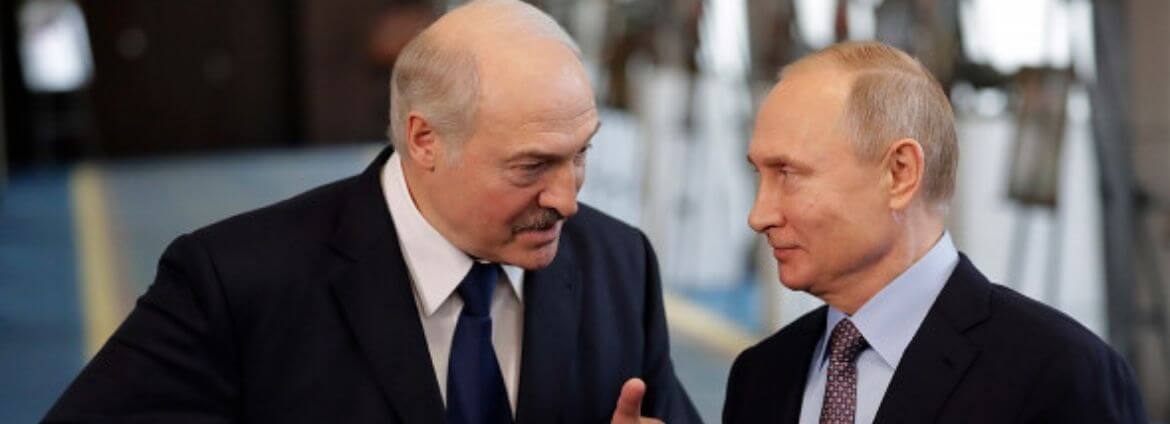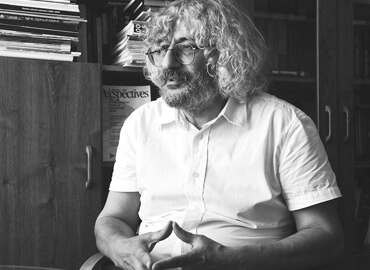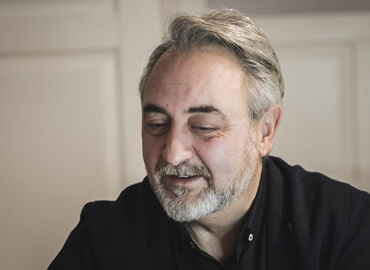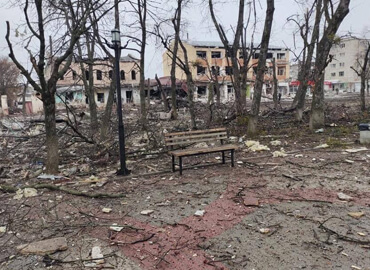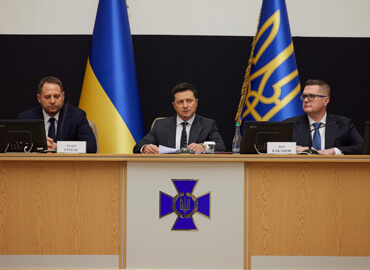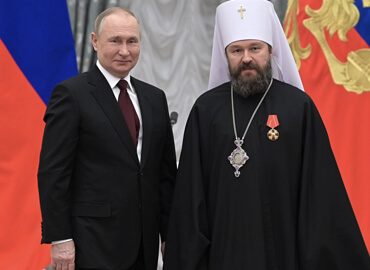Belarusians have a bitter joke that all Kremlin-inspired crackdowns and absurd practices that their Russian neighbors have had to face were – long ago or more recently – tested on the Belarusian people by the Lukashenko regime. Recently, attention has been drawn to the synchronization of activities of the two rulers in matters related to «genocide,» although in each of the two cases there are distinct features.
If this word has entered the political lexicon of Vladimir Putin relatively recently, then its use by Alexander Lukashenko is connected to the constant playing of similar tunes from the same record. Long before the nationwide protests in 2020, the resilient Belarusian politician at every opportunity mentioned the price that Belarus paid in its quest for victory during the Great Patriotic War (a politician who, with a background in history, stubbornly ignores the concept of «World War II») and, in depending on the gravity of international developments, has contemptuously run over the descendants of those who killed the Soviet people or «served the Nazis,» at times threatening to punish those who killed Belarusians.
His fixation on this aspect flourished after the first wave of suppression of protests in 2020. First, Alexander Lukashenko really wanted to gain the moral high ground over the «white-red-white-niks.» Since in his vision of the world the worst insult is «fascist» or «Nazi,» the pro-government media, full-time propagandists, Telegram-controlled channels, and bloggers began to actively promote the topic of «white-red-white policemen» who burned villages, waving this very flag now used by «unbelievable people» (although not a single photo or video documents this and not a single one of Lukashenko’s supporters has provided any clear evidence). Second, having moved on from the first shock and with difficulty hiding fear in the depths of his subconscious, he decided to take revenge on Poland, Lithuania, Germany, and other countries, which, instead of recognizing the election results (and hence the legitimacy of his next presidential term), supported his opponents. Rolling out the «genocide» case, the regime emphatically appealed to the «moral element,» maintaining that not only are the governments of Western countries aiding the runaway revolutionaries in rocking the stable Belarusian boat, but they are also sheltering those who are involved in the genocide of the Belarusian people (!). This topic is so critical for Lukashenko that on Monday he was visibly touched, presenting an award to his devoted henchman (and part-time Prosecutor General of Belarus) Andrey Shved, who said that he would seek the extradition of persons whom the Belarusian authorities believe are involved in the genocide. According to him, «SS members live in 19 countries of the world,» who once drowned Belarus in blood, and the Prosecutor General’s Office of Belarus will seek their extradition, although it understands that this is often impossible because «the political elite protects the Nazis.»
«With the prior consent of the head of state, the first reference and analytical materials on the genocide and the connection of fascism and Nazism with the events and ideology of those who tried to destroy our country in August 2020 have been prepared,» Shved said on February 21.
Lukashenko also called the genocide case «a great idea of the Prosecutor General’s Office,» which is not surprising, because it seems it will be possible to punish numerous dissidents within its framework, apparently consoling Lukashenko in a situation where the «world elites» will not extradite those whom he considers the executioners of the Belarusian people.
But if Belarusian officials, as part of the development of the genocide case, limited themselves to interviewing veterans of the Great Patriotic War and their contemporaries, then the Donbass separatists, with the direct support of the Kremlin, went even further in accusing the other side (Ukraine) of genocide, allegedly exhuming the bodies of people who died back in 2014. On February 11, the Russian news agency TASS, citing the head of the separatists Denis Pushilin, reported the discovery of more than 130 mass graves of civilians on the territory of the DPR, including the elderly, women, and children who «died from Ukrainian aggression.» The message was not picked up by many sources and went almost unnoticed, but on February 16, the Russian Investigative Committee informed that they had received data on «common unmarked graves in the Donbass.» According to Committee, people who died during the shelling of the settlements of Donbass by Ukrainians who used «lethal weapons of indiscriminate action» are buried there. They emphasize that the Russian investigation recorded «hundreds of such cases qualifying as the use of prohibited means and methods of warfare.»
«In August-October 2021, near city of Snezhnoye, the town of Slavyanoserbsk, in the Sokogorovka neighborhood of Pervomaisk, the village of Vidnoye-1 near Luhansk and on the outskirts of the village Verkhneshevyrevka, Krasnodonsky district, 5 mass graves were discovered. Of these, the remains of at least 295 civilians who died due to indiscriminate shelling by Ukrainian armed forces in 2014 were exhumed,» the official website of the Russian Investigative Committee says.
As a result, the Main Investigation Department of the Russian Investigative Committee opened a criminal case under Part 1 of Art. 356 of the Russian Criminal Code – «cruel treatment of the civilian population and the use in an armed conflict of means and methods prohibited by international treaty.»
Interestingly, the topic of «genocide of the population in Donbass» began to gain momentum after last week Vladimir Putin called what is happening in the Donbass region «genocide» during a press conference with the participation of German Chancellor Olaf Scholz. It is curious that already on February 19, speaking at the Munich Security Conference, Scholz said that the concept of «genocide» is not applicable to the situation in Donbass, and called such statements «ridiculous.» Moreover, on the same day, U.S. Secretary of State Anthony Blinken, in an interview with the television channel Dozhd, called Russia’s statements about genocide in the Donbass «absolutely incorrect and insulting,» since, according to him, nothing of the kind is happening there. Russian Ambassador to the U.S. Anatoly Antonov did not fail to respond, noting that Russia allegedly has materials on the burials of Donbass civilians who died from crimes committed by Ukrainian servicemen, and that he is ready to share such information with the American press.
In turn, the Ukrainian media report that the country’s counterintelligence services received detailed information on the implementation of a «genocide» scenario in Donbass, the goal of which was to accuse Kyiv of killing civilians and confirm that the exhumation of the bodies of those killed during the hostilities in 2014 (i.e., bodies that have lain in the ground for 6-7 years) is taking place in the villages of Slavyanoserbsk, Verkhneshevovka, Zolote-5, Pervomaisk, and Vidnoe-1. According to journalists citing Ukrainian intelligence, there burial sites of local residents have already been excavated who died of natural causes or even at the hands of militants themselves.
«After a DNA examination with the relatives of the missing, the Kremlin plans to slip the world some terrible fake news, presenting mass executions of civilians like the genocide in the Balkans. And to give legitimacy to the ugly falsification, an employee of the Russian Investigative Committee, Artem Artemov, was included in the group,» the 1 + 1 TV channel reported on the evening of February 20.
It is obvious that the task of promoting the subject of «genocide» was set by high-level authorities and the «internal affairs bodies of the DPR» alone could not have managed this. Why was the Investigative Committee of Russia given the task of investigating evidence of Putin’s version of the genocide? It is possible that the number one task is to denigrate Ukraine in the eyes of Western partners and justify the next «necessity» to interfere in the affairs of a neighboring state. It is also possible that such a media occasion would be useful for «internal» use, because in a war it is necessary to continually and as much as possible dehumanize the enemy.
It is interesting that Zheltye slivy, a Belarusian Telegram propaganda channel connected to the authorities, in addition to the obligatory laudatory posts addressed to Alexander Lukashenko and his associates against the backdrop of wide coverage of the «case of the genocide of Belarusians during World War II,» also began to actively promote the word «genocide,» characterizing Ukraine’s attitude Donbass residents. For example, they quote DPR activist Eduard Basurin, who accused Ukrainians of leaving many people without water due to the shelling in the Donbass, who calls this «genocide.»
These two simultaneously similar and different «genocide» cases once again show how «fused» Lukashenko and Putin are in their methods of maintaining and strengthening power. Both, in a certain sense, organize a performance for their «sworn friends» in the West so they can then blame these spectators at the same time. Finding no direct evidence for its theory, the Lukashenko regime began to create ghosts of the past, while the Kremlin essentially approved of going to any lengths possible.
Материал доступен на русском языке: От Москвы до Бреста с заходом в ОРДЛО



